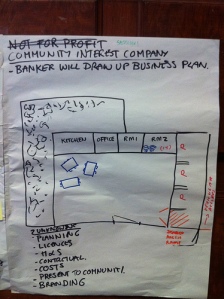
So I recently promised (on twitter) a blog post on my thoughts about co-production and it’s use in the public sector to design (or re-design) public services. I’ve been involved in various activities, trying to embed co-production in the council over the last year. I am convinced that genuine co-production, when professionals really listen, design and deliver with service users and citizens, rather than to them, can and has delivered real innovation and savings.
I was reading about Governance International’s 5 step public transformation model for rolling out co-production across an organisation, which makes a lot of sense. What I particularly like about this (apart from that is a visual), is that it demonstrates there are different ways into the co-production cycle. So for example even if you aren’t designing a service from scratch (at this point in time) this doesn’t stop you from getting service users engaged in commissioning, delivering, assessing stages.
That said, applying co-production across a whole organisation has many challenges and requires a big culture shift. Through my observations (and in my opinion) these are probably the toughest challenges and misconceptions to overcome:
Stick ‘co-’ on front and we’ve done it
We in #localgov love a good buzzword and often go crazy with them, using them interchangeably, killing the meaning and then getting them banned. I am worried about this happening to co-production, just sticking a ‘co-’ on the front of an adjective in a report doesn’t mean we can say the service has been co-produced.
Consultation is not co-production
Consultation is not co-production. Drawing up a list of pre-decided options and asking residents and service users to choose the ones they prefer is still consultation. There should be no pre-decided options in genuine co-production, options and ideas are developed with service users and residents and professionals (this doesn’t however mean that you shouldn’t set parameters to work within i.e. budget, time etc).
There’s no role for the professional
Many individuals fear that co-production means they will be out of a job. But genuine co-production is impossible without professionals to guide, support and use their knowledge, experience and networks to help service users design the most effective services and outcomes. Professionals also need to define and explain the parameters for co-production: What is the budget? Is everybody involved? What are the time constraints? Etc.
Cost, time, risk
It’s very easy to say we can co-produce a service in 4 weeks. In reality genuine co-production of services can be time intensive, cost money and ultimately will require you to take risks. It is likely that the ideas you come up with may not have been done before and are very unlikely to reap huge savings straight away. This doesn’t mean that the parameters for co-producing can’t be set, but genuine co-production cannot be rushed and proper budgeting, planning and an acceptance of risk are needed to succeed.
Where are the examples?
‘We can’t co-produce until we’ve seen an example of where co-production has worked on a similar service’. This is used to argue that co-production doesn’t work, because there isn’t anywhere that it has been done in exactly the same way on the same service. But co-production of a particular service will probably look very different when done with a similar service. This is because your service users are different people. They will have very different needs and wants from your service, including very different ideas about how to get them. Just because this hasn’t been done exactly the same elsewhere, doesn’t mean it can’t or shouldn’t be done.
These are just some of the challenges and misconceptions that I think need to be overcome when embedding genuine co-production across whole organisations in the public sector. I would love to hear your thoughts on these and what can be done to overcome them?



 Posted by Matt Skinner
Posted by Matt Skinner 

